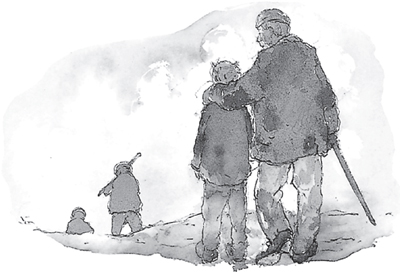

Well, the next day Thomas’s pasty was twice as long and twice as wide as anyone else’s, and as thick as a feather pillow. He couldn’t get it into his croust-bag, and Birdy had to wrap it in a flour sack and sling it over his back for him. It felt good and warm, and heavy against his back, and the savour of it from the neck of the sack dangling by his shoulder was mainly good!
The tinners all laughed when they saw it. “Who are you feeding, besides us?” they asked. “You be fair greedy for such a runtle!”
But Thomas thought it best not to tell them, and they didn’t keep teasing him long. So at croust time, when the little voice as his knee piped up, saying “Not so fast! Not so hasty! Give us a bite of that there pasty! We be mortal hungry! We be a-dying down here!”, Thomas cheerfully took up his great big pasty in his two hands, and held it out to the little fellow.

And blow me! All at once there was half a dozen of them, all jumping up and taking a bite, and the pasty was gone right down to the crust again, before Thomas could shout “Hey!”
“What about me?” he said, crossly.
“You get a wish,” said one of the little men.
Thomas thought how hungry he felt. “I’d wish for a nice fat pasty,” he said.
“Lookey see,” said the first little fellow.
“There’s what Buccas can do and what they can’t do. What they can’t do is fashion food. Try again.”
“I wish I worked by the sea,” said Thomas, for he was thinking how the fishermen didn’t have to share their pilchard pies with greedy great talking mackerel.
“Come, come, come!” cried the little fellows all at once, and they pulled and tugged at Thomas’s shirt and trousers, and then fair lifted him off his feet, and rushed him away with them, feet first, round and about and always downwards, through tiny tunnels where the roof scraped the skin off his nose as they went.

Down and down they carried him, till they reached the lowest level — the adit, where the waters of the earth drained out of the mine in a dark rushing stream, stained red by the tin ore washing down in it.
The Buccas didn’t stop for a minute, but waded into the rushing water, and carried Thomas along until they were at the outfall, where the adit broke out of the cliff face, and spilled all the waters into the sea.
On the very brink they put him down, with his head spinning, and there he stood, with the cliff towering above him, and plunging below him, and the sea spread out below. A gull came winging by him, and he could see a boat far out.

So Thomas had his wish, but it wasn’t what he wanted at all. It was a desperately dangerous place to be standing, even if your head wasn’t spinning and your heart hammering. Thomas barely looked at the sea, but went down on his knees in the water, and scrambled back up the adit, getting soaking wet as he went, and a long way it did seem! And then when he reached dry ground he had to yammer and cry, before someone came to find him, for he was very lost.

“How did you get down there for blessed sake?” Jack the tribute man asked him.
But Thomas didn’t like to say. “I missed my way,” he said.

Going home that evening, Thomas was so faint with hunger he could hardly walk.
Standback Jack had a word with him on the way. “It doesn’t do, you’ll find,” he said to Thomas kindly, “to eat a hefty morsel at croust time. It weighs you down. No wonder you feel queasy. Have a modest bite, and keep your hunger for your supper time. That way you’ll be nimble all day. Trust me for it.”
Thomas could have wept with the unfairness of it! And here was Birdy, coming up the path to meet him, to find how he had got on. She could see at once there was something wrong.
“What’s amiss, Thomas?” she asked him.
“I’m hungry!” he wailed at her. Well, by good luck she had a bannock in her apron pocket, made up with the scraps of the dough, that her mother had given her for her tea. Thomas wolfed it in one bite, and felt better.
“How was the pasty?” asked Birdy.
“I don’t know!” cried Thomas. “There wasn’t enough!”
“There’s something the matter with you, Thomas!” said Birdy. “We’ve fed mortal many bal-men and bal-maidens twice your size and more, and they’ve always been staunched and pleased with the fare!”

So Thomas told her about the Buccas.
“And there wasn’t any carrot left in your part?” Birdy asked him. “And there wasn’t any onion? And there wasn’t a morsel of tatties, or a taste of the gravy?”
“Nothing left but the crust,” he told her, miserably. “And most of that had my fingerprints on it, and couldn’t be eaten.”
“Couldn’t you tell them no?” Birdy asked him.
“You should see them, Birdy. They looked so ravened and wretched and starvling, you couldn’t deny them a bite, when you’ve your hands full of food.”
“We’ve got to think of something, Thomas,” Birdy said, “or you’ll starve to death. I’ll ask my mother and father.”
“We must bake him a famously larger pasty, then,” said Birdy’s mother.
“Doesn’t do to get across a fairy miner,” said Birdy’s father. “And they could do with some Buccas’ luck up there. The tin lode is nearly worked out, and there won’t be livings for much longer.”
